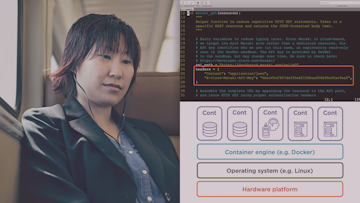
This course focuses on two major topics: Modern Cisco solution API usage and application deployment strategies. In this course, Consuming Cisco APIs and Understanding Application DevOps, you will gain the ability to deploy, test, and manage applications at a basic level. First, you will learn how to interact with Cisco products through their APIs. This includes products from across the Cisco portfolio, including enterprise networking, data center, service provider, security, and collaboration verticals. Next, you will discover the various application deployment strategies, such as using bare metal, virtual machines, and Docker...
Read more
Good to know
Save this course
Activities
Career center
DevOps Engineer
Security Engineer
Network Engineer
Cloud Architect
Software Engineer
Data Analyst
Marketing Manager
Technical Writer
Customer Success Manager
UX Designer
Product Manager
Project Manager
Sales Manager
Data Scientist
Business Analyst
Reading list
Share
Similar courses
OpenCourser helps millions of learners each year. People visit us to learn workspace skills, ace their exams, and nurture their curiosity.
Our extensive catalog contains over 50,000 courses and twice as many books. Browse by search, by topic, or even by career interests. We'll match you to the right resources quickly.
Find this site helpful? Tell a friend about us.
We're supported by our community of learners. When you purchase or subscribe to courses and programs or purchase books, we may earn a commission from our partners.
Your purchases help us maintain our catalog and keep our servers humming without ads.
Thank you for supporting OpenCourser.


